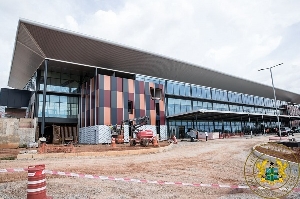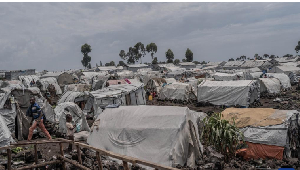- Home - News
- TWI News | TV
- Polls
- Year In Review
- News Archive
- Crime & Punishment
- Politics
- Regional
- Editorial
- Health
- Ghanaians Abroad
- Tabloid
- Africa
- Religion
- Election 2020
- Coronavirus
- News Videos | TV
- Photo Archives
- News Headlines
- Press Release
General News of Wednesday, 23 April 2003
Source: public affairs department, ghana embassy, washington, dc.
The Woodrow Wilson Center Discusses Ghana.
The Woodrow Wilson International Center for Scholars in Washington, DC, has held a discussion on contemporary Ghanaian politics and its leader, President J.A. Kufuor at its Center in Washington, DC.
Under the topic, The Present is From The Past: Memory and History in the light of President Kufuor’s Biography, the discussion was based on the recently launched book, Between Faith and History: A Biography of J.A. Kufuor by the journalist and diplomat, Mr. Ivor Agyeman-Duah.
Mr. Agyeman-Duah, who led the discussion had as a discussant Prof. Ben-Fred Mensah, a political scientist at Howard University in Washington DC, and was moderated by the Director of the African Studies Programme of The Paul H. Nitze School of Advanced International Studies, The Johns Hopkins University, Prof. Gilbert Khadiagala.
Mr. Agyeman-Duah paid tribute to the Center and the late Woodrow Wilson, who combined impressive scholarship with politics and became the 28th President of the United States.
He said, since 1990 when Ghanaians re-opted for multi-party system, the country has re-gained its post-independence influence in the geo-politics of West Africa.
Even the political twists and turns that culminated in the 1992 transition, Jerry Rawlings transferring power by the legitimacy of elections, whether fair or controversial, he argued, introduced a paradigm change in the West Africa politics.
According to Mr. Agyeman-Duah who is the Minister Counselor of Information at the Embassy of Ghana in Washington DC, the paradigm change influenced especially the politics of Nigeria in the 1990s as seen in the actions of both Ibrahim Babangida and Sani Abacha in their attempted perpetuation of power. But while it brought multiple and shocking changes in Nigeria’s political landscape in its post-election of 1998, The Gambia under Yaya Jammeh, succeed himself under the paradigm from Ghana.
According to the Ghanaian author, though Ghana’s transition in 1992 was not the first in the past decade and a half in Africa, it is its consolidation and a resolution by Ghanaians to make it work that brings out the brighter influence.
Mr. Agyeman-Duah argued further that; “Ghana finds itself in a geographical area that is on fire. The war in Sierra Leone, the re-charging of the Liberian civil war, the uncertain future in the Ivory Coast, the religious and ethnic clashes and death in Nigeria plus, its recent post-election threat to peace, have become political misfortunes.’
Though Ghana maybe stable and Ghanaians may feel secure it could only be a false one since in the politics of the sub-region, when your neighbor’s house catches fire, it only alerts you of the possible conflagration of your own.
According to him, as the drama of the Kufuor presidency unfolds, and especially during his chairmanship of ECOWAS, it would be interesting to see how the relative peaceful platform in Ghana would be used to quench the embers of these political misfortunes in West Africa without Ghana’s domestic and ongoing economic revival becoming causalities.
Mr. Agyeman-Duah expressed the belief that the challenge of Pan-Africanism facing President Kufuor in the early 2000s is how to expand the peace and stability in Ghana to a regional horizon as ingredients which alone can propel economic development as enshrined in the ideals of NEPAD, AGOG and other domestic and international intensions.
On his part, Prof. Ben-Fred Mensah said Mr. Agyeman-Duah’s book, whose American edition is coming out in July, 2003 from Africa World Press in New Jersey, is a good recommendation to anyone who wants to find out how tenacity, faith, wealth and humility contributed in making an African president in the twenty-first century. But by assuming that some readers will be conversant with some issues, he said, it creates a shortfall in certain analysis.
Touching on the ongoing politics, Prof. Mensah said for Ghana to sustain its democracy, the Danquah-Busia tradition must have a national focus and feel more comfortable with people from non-Akan areas.
For the opposition to also effectively play its role, the Nkrumahists and the Rawlings tradition must, because they share the same things in common, unite. For now, he said, ‘the only thing that unite them is ‘Convention’.’
Ex-president Rawlings, he explained ‘does not want to transform himself from a politician into a statesman and this is making the sincerity in President Kufuor’s pledge to treat him with all the respect due an ex-head of State difficult.’
Prof. Gilbert Khadiagala, the Kenyan scholar who is also emeritus Africa Director of the Wilson Centre lamented the absence of Africa presidential biographies and wondered where the culture of writing had gone. He said within two years of President George Bush Jr. being in power, nearly ten biographies have been written on him and therefore urged African journalists, intellectuals and presidents to write.
Prof. Khadiagala like his compatriot, Ali Mazrui, who wrote the Foreword to President Kufuor’s biography, praised Kwame Nkrumah and Ugandan President Yoweri Museveni for their memoirs. Recent African speakers and invited guests at the Woodrow Wilson Centre programmes have included U.N. Secretary-General Kofi Annan, President Yoweri Museveni who spoke on Tomorrow’s Africa and President Joaquim Alberto Chissano on ‘Mozambique.’
Opinions









